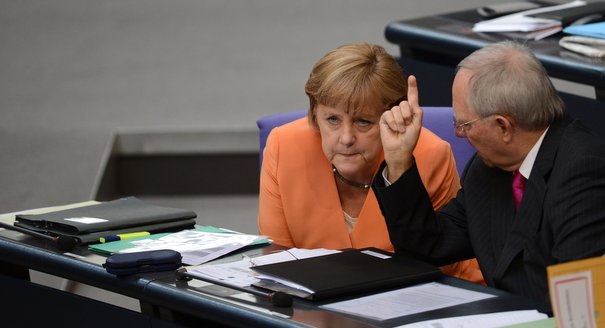When German Chancellor Angela Merkel was elected for a second term in 2009, her junior coalition partners, the Free Democrats, had one main economic policy: lower taxes.
You would think this would be popular with most Germans. After all, such measures would leave more money in people’s pockets, boosting consumer spending and increasing imports. This, in turn, would create more jobs and help Europe’s economy.
Yet every tax proposal the Free Democrats made was criticized for supposedly favoring the rich. The party helped that impression, too. When it pushed through a lower rate of value-added tax for hotels, it was immediately accused of bowing to a particular lobby.
Now, with only five months to go before Germany’s next federal election, taxes and spending have jumped to the top of the campaign agenda.
This issue has put Merkel in a tight spot. While she is still defending her austerity plans for debt-ridden eurozone countries, Germany’s opposition parties are pledging to tax more and spend more if elected this September.
Such a change of policy could have a domino effect throughout Europe. After all, it was Germany that was at the forefront of calls for less, not more, spending.
So why does the opposition see higher taxes and higher spending as a winning strategy?
The reason is the German public’s growing concern over matters of social justice—an issue that is going to be hard for Merkel to avoid.
Economic studies show that, over the past ten years, incomes have become far more unequal in Germany. This has hit a raw nerve with many Germans, who believe that the growing gap between rich and poor will undermine the social solidarity system that was established after World War II.
There is also a widely shared populist sentiment directed against bankers who continue to receive big salaries. At the same time, since the beginning of the financial crisis in 2008, the taxpayer has had to spend untold billions to rescue troubled banks.
The opposition Social Democrats, as well as the Greens and the more radical Left Party, have made social justice the core of their election campaigns. They are determined to raise taxes for the wealthy, introduce a wealth tax, restrict executive pay, and extend the inheritance tax.
Peer Steinbrück, the Social Democratic candidate who is running for chancellor against Merkel and who served in her first government as finance minister, also intends to introduce a minimum wage of €8.50 ($11) per hour, increase social security spending, and give low-income workers far more support.
According to research by Deutsche Bank, about 25 percent of all employed people earn wages that are one-third below average. In 2000, that share was 20 percent.
The opposition Greens are calling for even steeper tax hikes than the Social Democrats. At their party congress in Berlin last weekend, one of the few dissenting voices was Winfried Kretschmann, the Green premier of the southern state of Baden-Württemberg. As governor of that hothouse of German industry, Kretschmann knows all too well how higher taxes would affect Germany’s small and medium-sized companies, known as the Mittelstand.
Chancellor Merkel’s Christian Democratic Union has yet to present its own election program, but the party has made it clear that it is set against tax increases. Merkel has also defended the social reforms that her predecessor Gerhard Schröder began ten years ago. Ironically, Schröder was a Social Democrat, just as Steinbrück, who now wants to disown many of those reforms.
“I see Germany as a country that shows how effective reforms can be,” Merkel said last week in an interview with the mass-circulation newspaper Bild. “Many in Europe will remember that, just ten years ago, Germany was described as the ‘sick man of Europe.’ ”
Then, as if in a warning shot to the opposition, she said “there is no such thing as on-tap wealth, and the public needs to understand that.”
Merkel is still very popular domestically, but in Europe her calls for austerity are met with increasing skepticism. In the eurozone’s crisis countries, but also in Paris and Brussels, there are many who will hope for a change of government in Berlin.
The battle lines are drawn for an election that will have an enormous impact on the future course of Europe and the euro.






.jpg)